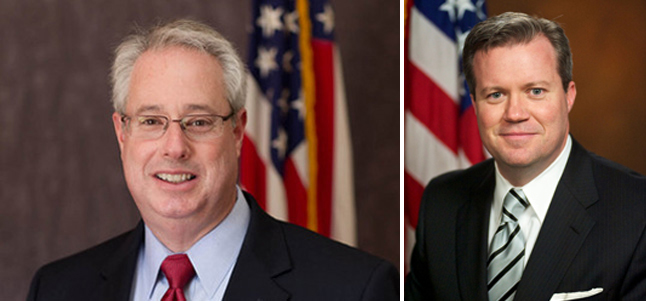
Twitter.com and USDOJ
State Attorney General Sam Olens and U.S. Attorney Michael Moore spoke in Macon Tuesday at a summit on child trafficking.
From The Macon Telegraph (MCT)
Though Georgia has made strides in attacking sex trafficking violations across the state, there is still plenty of work to do, beginning with educating the public on the issue.
That was the message from state Attorney General Sam Olens and U.S. Attorney Michael Moore in Macon Tuesday at a summit on child trafficking.
Olens described how the state strengthened laws in 2011 against sex trafficking as well as the punishment that goes with it. He said a case in Eastman, in which a couple forced their 14-year-old daughter to have sex with a 66-year-old car dealer in exchange for car payments, opened the eyes of many lawmakers in Atlanta.
Moore said tougher laws and penalties on commercial sexual exploitation of children will deter people seeking to ensnare a child as a sex slave, as well as fear of the public embarrassment that would follow.
Still, the two said, the public, law enforcement and community organizations need to be better educated on the basic issues.
Olens said the GBI now provides training to other law enforcement agencies in Georgia, which has led officers across the state to recognize when sex trafficking might be taking place.
“It’s essential police officers and investigators know what to look for, what to ask,” Olens said. “Every two weeks, there’s an indictment or arrest in Georgia (related to trafficking). It used to be unknown.”
The state has started a Georgia’s Not Buying It campaign to help raise awareness.
Moore said children engaged in trafficking shouldn’t be called prostitutes, because they are engaged in sexual acts against their will.
“We ought to use (the terms) ‘trafficker’ and ‘victim,’ not ‘prostitute’ and ‘john,’ ” he said.
Moore said part of the problem is that people in general are uncomfortable talking about the issue, and public officials are concerned that discussions about sex trafficking will hurt their city’s image.
“We need to talk partnerships and not politics,” Moore said.
Both men said that people need to be aware that children are generally 12 to 14 years old when they’re first victimized.
The public also needs to report suspicious activity to law enforcement, such as strangers photographing children in a public place.
“Predators look for children who are runaways, who are abused and ignored,” Moore said.
Olens said there’s probably going to be new legislation introduced next year that will extend and strengthen Georgia’s sex trafficking laws.
He said there aren’t many statistics available to illustrate the problem, but said anecdotal evidence suggests that changes to the law have made a difference, and that out-of-state traffickers are starting to avoid Georgia.
According to statistics at the conference, there are 100,000 or more children across the U.S. who are being commercially exploited, the average age of whom is 13. About 25 percent of women are sexually abused by the time they reach adulthood, and the average life expectancy for a girl involved in forced prostitution is about seven years.
Beth Morris, executive director of Hope Haven, organized the event. She said the idea behind the conference was to gather local and state officials to learn more about human trafficking in the midstate. She said there are plans to soon open a secure facility in Macon for children who have been rescued from traffickers.
State Rep. Bubber Epps, R-Dry Branch, attended Tuesday’s session and said lawmakers are much more aware of the problem these days.
“I see more and more attention to it,” he said. “Those of us (in the Legislature) are cognizant of the underlying issues. I’m impressed with the program today. It shows a collaborative effort. There’s a need for corrective action. We can’t wait any longer.”
To contact writer Phillip Ramati, call 744-4334.
———
©2014 The Macon Telegraph (Macon, Ga.)
Visit The Macon Telegraph (Macon, Ga.) at www.macon.com
Distributed by MCT Information Services